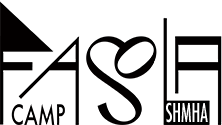A Testimonial from Buell Cobb
Buell Cobb is the author of The Sacred Harp: A Tradition and Its Music, and a perennial favorite Camp teacher.
Hearing recently that Camp registration is lagging a bit behind earlier years’ stimulated my busybody impulse… Surely, it occurred to me, there are great potential Camp registrants out there who just need a nudge… Specifically, those who would love this experience but who haven’t yet summoned the picture of the whole that makes it something you just have to borrow against—from your future, or your future savings…
I used to be such a person. A number of Camp veterans over a several-year period urged me to attend. I put them—and it—off. I was busy, committed elsewhere. Some more convenient time…
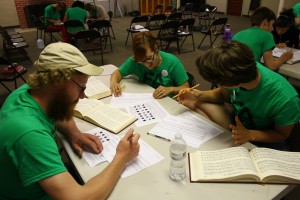
Students learn about Sacred Harp music by trying their hand at writing a song during the “Composium Workshop” at Youth Camp.
When what I actually lacked was a picture of what I was missing. That picture filled in for me compellingly two summers ago when, at David Ivey’s suggestion, I wandered up to take in a half-day of the Youth version at Camp Lee. I was pretty much bowled over. What a great bunch of kids (and others, including several senior citizens), and what fun they were having! Playing together, learning together, eating a boisterous meal together. And then, in the evening, what beautiful, spirited singing (in what a fantastic acoustical setting)! I was hooked.
Last summer, I took David up on an offer to “teach a few classes” at both the Adult and Youth Camps, though I had a heck of a time thinking of something I could helpfully impart. Both camps were near-transformative experiences for me. I loved the interaction with people from all over the country (and several from other countries). I relished, as I think surely everyone did, the opportunities to visit over meals, at break times—to absorb lessons and great observations from an all-star panel of teachers (just look at this list from the Adult Camp!): Warren Steel, Judy Hauff, Dan Brittain, Aldo Ceresa, Jesse P. Karlsberg, Henry Johnson, Lela Crowder, Chloe Webb, Judy Caudle, Karen Rollins, Tom Malone, Robert Kelley, Samuel Sommers, Elder J. L. Hopper, Cassie Allen, Matt Hinton, David and Stuart Ivey.
And oh, the singing! At both camps. Wonderful, wonderful stuff. Night after night of it. (And this sandwiched between singings or conventions to attend before and after Camp.)
But I’m leaving out the obvious: It is, first of all, Summer Camp—without much, if any, of the famously woeful effects of Camp Granada (and to music from White, Walker and Reese instead of to the string-stabbing strains of Ponchielli). Both Camp McDowell and Camp Lee offer beautiful Alabama woodland. The everyone-pitch-in spirit is enough to jolt anyone out of the summer blahs (or being needlessly bogged down in oneself). It’s wholesome Americana—with one of America’s great music traditions. There’s a reason some people attend the camps year after year (and it’s not that they’re needful of that much instruction!). It’s that the experience is too much of a highlight to miss out on.
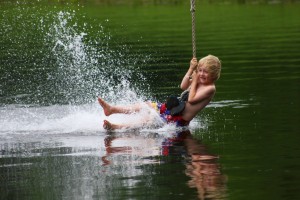
Splash! A young camper enjoys the zip line at Youth Camp.
I’m tentatively lined up for two or three classes to conduct again this summer, including one in which I plan to share long (but not boring, I promise) reminiscences of two great Sacred Harp figures born in the last decade of the 19th century: Ruth Denson Edwards and Dewey President Williams (the RDE piece has new material from the one shared last year). I don’t know that the teacher line-up has solidified yet, but I know it will again be wonderful. All that seems to be needed at this point is another year’s all-star cast of registrants. You, in fact, may be all so far that’s missing… Can we please fix that?
This, then, is my hearty testimonial—but I’m good for more if anyone has questions or needs additional encouragement. If so, just holler at me offline. (I’m not an expert in the area of personal finances, but if that is the stumbling block for you, you might guess what I will be recommending as budget reallocation…) More technical questions (lodging, etc.) can be forwarded to camp@fasola.org. I’m including below David’s links to pages with registration information on each of this year’s three camp sessions.
Finally, to paraphrase a line from a song that Dewey Williams used to enjoy leading wherever he went: Let’s camp a while in the (beautiful) wilderness!
A Testimonial from Eimear O’Donovan
Eimear O’Donovan is a Sacred Harp singer from Cork, Ireland. Eimear spent much of the summer in the United States in 2012 and attended Camp Fasola, Youth Emphasis.
Hello friends.
This is a note with the express intention of telling all y’all what a good time I had at Camp Fasola in Alabama, why I’m planning on making the trip to Camp Fasola in Poland in September, and why I think you all should join me, if at all possible (even a tiny bit).
I started Sacred Harp singing two and a half years ago, with Juniper Hill’s class in University College Cork. I spent the first three months being intimidated and thinking “this music sounds absolutely amazing but it’s so HARD and I can’t get the hang of it, it’s really not for me (but oh gosh does it sound great)”. The class broke up in May, and I was keen to share the shape notes with friends and family at the class’ showcase singing we had at the end of term. Something had taken hold of me.
Sometime in June, I heard Rob Wedgbury and Juniper were trying to put together a weekly singing in place of the weekly class, to keep the momentum going. I got onto Rob and soon we started meeting in a pub called an Spailpín Fánach, to continue learning Sacred Harp from Juniper, picking up new songs each week. I still felt like I didn’t know what I was doing, but in this more relaxed environment with smaller numbers, I started getting more and more into the singing. This singing ended up moving to Camden Palace Hotel, a wonderful community-run arts space in Cork City Centre which exists on a diet of no funding and lots of hard work from the fantastic people who keep it going. (This weekly singing is still going strong every Thursday night, 2 years later.) Soon, under Juniper’s guidance, we were planning for the first Ireland Sacred Harp convention, and I guess “the rest is history”.
The reason I start with my own “origin” story of Sacred Harp singing (and in a way, the Cork origin story), is because it is not unique – in Europe or elsewhere. In fact, it kind of doesn’t even matter how you get into this singing tradition, or what your background is.
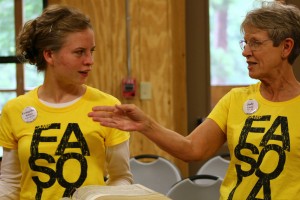
Camp instructor Judy Caudle teaching a leading workshop at Youth Camp.
“All you need to take part in Sacred Harp singing is a desire to sing.”
Dublin and Belfast are hot on our trail, with weekly singings in both locations. This summer, there are first singings popping up in Berlin and Glasgow. Bremen have been at it for a while now. Paris have been working on it from the ground up, with a bunch of singers but nowhere to sing (yet). Poland are veterans, with 4 years under their belt, and their first convention fast approaching. The UK have been at it for nearly two decades, with their 17th convention coming up in September. And it’s not difficult to look to the US and find a plethora of singings, set up by a bunch of people with no idea what they’re doing or what it means, but with a love for this music and a desire to take part. It is only later that we realise the community spirit inherent in this tradition: this dialogue which transcends age, location, gender, viewpoints political or religious, musical background, life story… It doesn’t take much until you find yourself with affections for humans you’ve never met, be they composers who lived a hundred years ago or a singer from afar whose voice you recognise from recordings.
I believe we are at a hugely exciting time in Sacred Harp history. We are right in the middle of an explosion of participation in places where, historically speaking, there have been no ties to Sacred Harp or shape note singing. Alabama, Georgia and the southern states of the US have the obvious advantage, with Sacred Harp singings there that have been going for over a century and families that have sung for generations. New England has countless connections with composers of shaped note music. Many of these tunes came from old English, Irish and Scottish folk tunes. But Poland? France? Germany? Australia??
We need to recognise the significance of what is happening, and what can happen next. I see Camp Fasola Europe as an unmissable opportunity and information-sharing resource for the European singers (and the further-away singers).
This is for two main reasons:
- Camp is an opportunity to network/connect/make friends with singers from other areas. For us newbies to this rich, old, old tradition, it’s a wonderful place to come together to share ideas: to compare stories and ideas on different ways of setting up singings, organising conventions and singing schools, getting newcomers along to singings, travelling to signings, and so on. You can learn a lot from those in the same position but different locales, AND…
- You learn SO MUCH in the classes. Guys!! It’s a week of singing with people from different places, and learning from singers, teachers and composers who have been doing this for much longer than we have. Camp brings you right back to basics. For the last two years I’ve been mostly learning this music by ear. Camp brought me right back to the rudiments of the book and said “this notation makes it so easy to sight read music – LEARN IT PROPERLY and you can sing any song in the book on sight”. And it’s been working. Camp is a week of classes, with topics including Sacred Harp etiquette, history of the tradition, arranging, keying, dinner on the grounds, leading, scales & intervals, anthems… And, every morning, we have a class in the rudiments of the music. This means every morning you get a class in Sacred Harp theory, which strengthens your sight-reading and knowledge of the music as it’s written. YOU LEARN SO MUCH. I cannot stress this enough.
There’s also activities and hiking and running around and meal-sharing and bunk-bed hijinks. (The jinks aren’t that hi or anything. But they’re still jinks, ya know?)
Teachers for European camp include David Ivey and Judy Caudle, both life-long singers from Alabama and established friends of Europe; Jesse P. Karlsberg, Sacred Harp historian, singing school teacher, and all-round fun guy; Tim Eriksen, the singer, performer, ethnomusicologist, and lecturer responsible for the Sacred Harp music used in Cold Mountain; and P. Dan Brittain, composer of Euro-faves “Akin” (472), “Cobb” (313b) and “Novakoski” (481).
The first European Camp Fasola is something that we only get to do once, so let’s make it count.
In conclusion,
COME TO CAMP!
A Testimonial from Fynn Titford-Mock
Fynn Titford-Mock is a young Sacred Harp singer from Norwich, UK. Fynn wrote about Camp Fasola Europe for the Sacred Harp Publishing Company Newsletter and has graciously allowed us include an excerpt here.
In the spring, when I first considered attending Europe’s first ever Camp Fasola, it seemed like a distant fantasy, and I had dismissed it as being too expensive. But a large part of its success was due to a few very generous souls who donated funds, both by official and informal means, to enable many singers (including myself) to help cover the cost of attending. We are privileged to be a part of such a kind-hearted, generous community.
I did not know what to expect of Camp, but I was very excited by the prospect of spending several days singing and learning. Most of the Camp participants had attended the UK Convention, and traveled together to Poland. Arriving at the airport on Monday morning, we were greeted by a bright pink WizzAir plane to Gdansk. Polish singer Kuba Choinski met us with a coach to take us to the Camp venue. The journey took us through the picturesque Kashubian hills, villages, forests, and lakes to the town of Chmielno. The venue, Wichrowe Wzgórze (translated as “Wuthering Heights”), was far beyond what we were expecting for accommodation—it felt almost like a luxury hotel, with its idyllic location overlooking Lake Klodno. There was time for a few of us to run down for a quick (and chilly) dip in the lake before Camp got underway.
The food at Camp was very good, mainly consisting of traditional regional Polish dishes (though at first there were a few teething problems with the European comprehension of the term “vegetarian”).
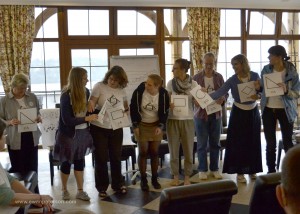
Campers from across Europe and the United States line up to form the major scale during a beginning rudiments class at Europe Camp.
Lessons at Camp center on approaching singing from The Sacred Harp from the beginning—literally, “the Rudiments.” With basic and advanced classes, we looked at the fundamentals of the music, through the departments of time, tune and accent—including how to beat time, hints and exercises for learning the shape-note syllables, choosing the right key for a song, how to convey your intentions when leading, and striving for a good emphatic driving accent—all demonstrated practically through singing.
It’s difficult to highlight any specific favorite moments at Camp, as it was all excellent. One of the lessons I enjoyed a lot was “The Best of The Ungreatest Hits.” We sang songs from the bottom 20—that is, the pieces that have been least used, according to the minutes; I have never heard “The Bride’s Farewell” (p. 359) sounding so good! A few of us got together for a “Team Tunesmith” exercise: after choosing a text to set, each participant wrote a tenor part, then passed it on to the next person, who wrote the bass, and so on again to the treble and alto parts, so that in the end we had four communally-composed songs. The “Keying Music” lesson was also very interesting, as it is something I am working on at the moment in the singings in Norwich. It was also great fun (though tiring!) to sing as many anthems and odes in one lesson as we could.
Some of our Thursday evening singing was recorded by Camp participant and freelance journalist Kate Mossman for a short broadcast on the BBC World Service. Kate also interviewed some of us for the program and published two articles about Sacred Harp featuring Camp Fasola Europe, one in The Times (subscription required) and another more recently in Songlines world music magazine.
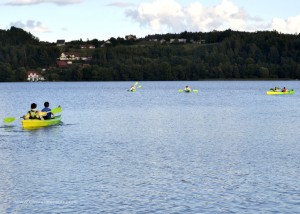
Canoeing in Lake Klodno at Europe Camp.
For anyone who might think they couldn’t possibly cope with a whole week of singing—well, there were plenty of things to do that didn’t (necessarily) involve singing (having said that I did almost lose my voice during the week). We could go boating and swimming in the lake, try our hand at making some traditional Kashubian pottery, ride in a haycart, and try Nordic walking or cycling. In addition, some of the electives were opportunities to rest tired voices, such as learning about arranging at a convention, or discussing how to prepare suitable food for a convention—we even made a dessert! We also had a chance to see some traditional Kashubian folk dancing and singing, and enjoyed an evening recital by Camp instructor Tim Eriksen.
I think it is very important for anyone who loves and regularly sings the music of The Sacred Harp to experience Camp Fasola. This is the closest thing today to the singing schools which kept the Sacred Harp singing tradition alive during the nineteenth- and early twentieth-centuries. Not only will you learn an awful lot, but you will have a lot of fun doing so, and return home having made lots of new friends.
Camp is not intended just for new and young singers, and this was really evident in Poland. A few of us had been singing for a matter of weeks, others for twenty years; some for about three years, and others since childhood. Campers embraced the wide range of ages and backgrounds that are a key part of what defines the Sacred Harp community.
Our thanks must go not only to the Polish Sacred Harp singers who helped organize Camp, but to all the teachers/leaders, who gave us the benefit of their wisdom, humor, and experience. And of course to all the participants—I am proud to call you my friends, and hope that we will sing again as soon as possible!
